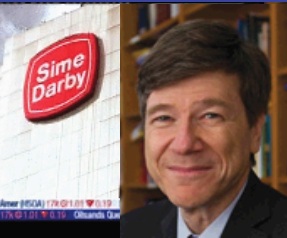 Professor Jeffrey Sachs of The Earth Institute, Columbia University – a ‘champion’ of Sime Darby?
Professor Jeffrey Sachs of The Earth Institute, Columbia University – a ‘champion’ of Sime Darby?
Sarawak Report has uncovered shocking documents, which detail a deliberate and orchestrated campaign by the Malaysian Oil Palm giant, Sime Darby, to court and seduce one of the world’s most celebrated economists into becoming an ‘Ambassador’ for the company.
Jeffrey Sachs is the Professor of Sustainable Development at New York’s Columbia University and was listed by Time Magazine as one of the 100 most influential people in the world.
As Head of the University’s Earth Institute, Special Adviser to United Nations Secretary-General Ban Ki-Moon and former Director of the United Nations Millennium Development Goals, Sachs is famous for his initiatives on reducing world poverty.

- Horizon to horizon – Sime Darby’s HQ for its plantations between Miri and Bintulu
Yet, despite the World Bank’s decision to ban further lending to large scale palm oil plantations, because they have been shown to INCREASE poverty, Sime Darby believe, according to these documents, that they have converted Jeffrey Sachs into a valuable ‘champion’ for their company and for Malaysia’s palm oil industry.
Our evidence shows that Sime Darby, Malaysia’s largest oil palm company, hired the disgraced PR outfit FBC Media to ‘cultivate’ and ‘influence’ this key opinion former, so that they could use him as a ‘Third Party Endorser’ in the numerous newspaper advertisements and TV programmes they commissioned to promote their palm oil business.

- Professor Sachs praises Sime Darby and the Malaysian Government’s initiative on sustainability in a full page Advertorial in the Herald Tribune, next to CEO Musa Hitam and an ad for Iskandar
For example, in this Herald Tribune full page advertisement Sachs authored a guest piece back in 2008, praising the Malaysian Government and Sime Darby for their supposed initiatives on sustainable development. Alongside, is a second feature by Sime Darby CEO, the former Deputy PM Musa Hitam, and also an advertisement for Malaysia’s development zone, Iskandar.
There is no indication as to who financed the advertisement or whether Professor Sachs received any form of payment. However, we can demonstrate that his Earth Institute has just received a half million dollar donation from Sime Darby towards its projects and that Sachs has personally accepted family trips to Sime Darby’s Carey Island plantation, where he was transported in the company’s private jet.
As part of his substantial write up for the advertorial the professor endorses Sime Darby’s eco-credentials:
“Some promising steps have been taken by Malaysia in recent years, which may set a powerful example for the rest of Asia… The government is working closely with leading companies, such as the palm-oil giant Sime Darby, which have recognized that long-term environmental sustainability is vital to the business interests of serious, law-abiding companies with long-time horizons” [Int Herald Tribune, 20/06/08]
Destructive giant
Yet, the eco-claims of Malaysia, Sime Darby and Iskandar are, of course, highly questionable. The Iskandar part of the advertisement carries the slogan ’Growing In Harmony With Nature’. However, that project has controversially destroyed one of the last remaining mangrove areas on mainland Malaysia and displaced the indigenous Seletar people, the region’s last sea nomads, from their fishing grounds, which are now depleated and polluted by the development.
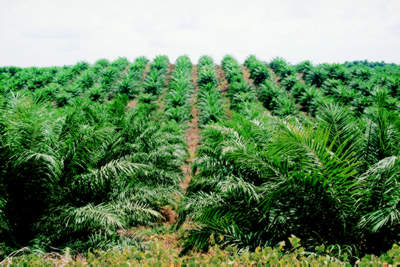
- Cleared for mono-culture – Sime Darby has 47,000 hectares under cultivation in Sarawak
Likewise, Sime Darby, which is controlled by the Malaysian Government, is the world’s largest palm oil company and its vast plantations have destroyed huge areas of Sarawak’s coastal peat forest in the region between Miri and Bintulu and elsewhere.
Apart from the environmental destruction of Borneo’s valuable rainforest, these plantations have alienated Native Customary Lands from local tribes and communities and most of the resulting jobs are poorly paid and have been handed increasingly to immigrant workers and not local people.
Sime Darby’s latest controversial activities have moved outside of Sarawak, where it has planted 47,000 hectares, into Liberia in Africa, where native communities are protesting that the company has been taking their ancestral lands and causing them hardship.

Moving to Africa - Sime Darby is currently up to its old tricks displacing native communities in Liberia. So much for sustainable development.
Indeed, just last month theLiberian Government finedSime Darby US$50,000 for non-compliance with the terms and conditions of their permit. So, it appears that the company is not so law-abiding after all.
Incentives?
The intervention by Sachs was doubtless well-intentioned. However, exclusive documents obtained by Sarawak Report prove that FBC believe they had succeeded in their campaign of ’cultivating’ and ‘influencing’ him and others into becoming one of the useful ‘tools’ they were able to offer their clients for their PR campaigns.
Sachs has appeared in numerous promotional articles and TV programmes commissioned by Sime Darby from FBC, before that company was exposed for its illegal PR activities earlier this year. These programmes included Third Eye on BBC World and CNBC’s World Business Programme.
In a pitch made by FBC to Sarawak Chief Minister Abdul Taib Mahmud for the multi-million ringgit contract to promote SCORE (Taib’s pet development project) the PR company brags that their successes for Sime Derby included:
“The cultivation of influential ‘ambassadors’, such as The Earth Institute’s Jeffrey Sachs or Dr Reza Azmi, of wild Asia, leading voices on environmental issues”
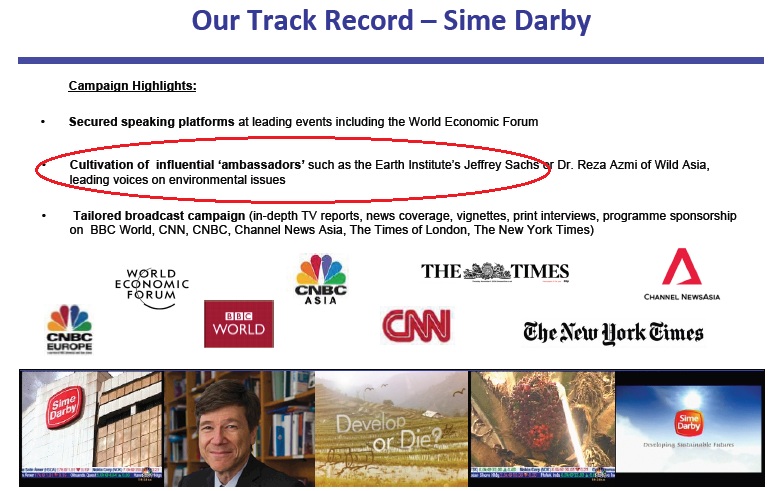
- “Cultivation of influential ‘ambassadors’ such as The Earth Institute’s Jeffrey Sachs” – FBC’s ‘Track Record with Sime Darby’
Embarrassing
Such claims can only be embarrassing for Jeffrey Sachs, particularly in the light of the fact that only last year Sime Darby was included in The Earth Institute’s prestigious “Corporate Circle” of companies, described as “dedicated to sustainable development”.

Sime Darby's $500,000 donation to the Earth Institute's Corporate Circle projects on joining last year
The Institute, of which Sachs is the Head, explains “We promote opportunities to join the Earth Institute in building strong links between corporate sustainability and holistic sustainable development”.
At the same time Sime Darby provided a half million dollar donation to support The Earth Institute’s Tropical Agriculture and China programmes.[Our Donors]
Given the claims by FBC, Professor Sachs may now have to consider whether such support and the huge financial gestures he has accepted on behalf of his Institute were merely a cynical ploy on Sime Darby’s part to ‘cultivate and influence’ him as part of the company’s well-funded campaign to counter a mass of environmental criticism about the destructive nature of their business?
‘Corporate Greenwash’
FBC’s presentations make clear that their objective for Sime Darby was to ”counter negative perceptions surrounding the Palm Oil Industry”, through “managing and influencing the news agenda” and “sophisticated corporate messaging within an editorial framework”.
Under one section entitled “Palm Oil’s Sustainable Future: Myth or Reality?” they lay out in detail how they plan to spend a good chunk of the industry’s millions on altering world perception:
“Palm oil…remains surrounded by controversy with its production methods triggering fierce debate and harsh criticism from the ‘green lobby’…..The following slides outline FBC’s production strategy for producing editorially credible content for placement on international, pan-regional broadcasters, helping re-set the debate around palm oil and its sustainability and initiating a wider, more objective dialogue”.
Their presentations also make clear that their strategy was to “cultivate Sime Darby ‘champions’” and “target organisations and opinion formers” who could be quoted in their articles and films.
- “]
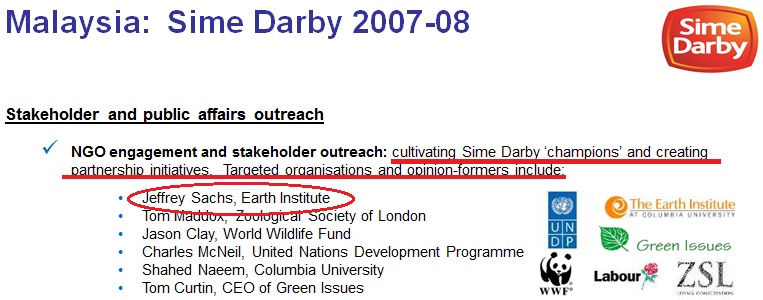
- Targetted opinion-formers – Jeffrey Sachs was top of Sime Darby’s list [FBC Power Point Presentation
FBC go on to explain that their promotions, which posed as objective journalism, would create the appearance of balance by featuring critics, who would then be over-ruled by more sympathetic voices to their clients.
"To keep the reporting balanced, we will interview NGOs leveling criticism at the industry, but then getting responses from the key players in palm oil production from countries such as Malaysia, where sustainable certification is promoted and forest conservation efforts are underway". [FBC Media Presentation]
The strategy, eplains FBC, is to present Sime Darby as a well-meaning company striving towards ‘sustainability’ by making all the right gestures… and also all the right friends. They call it “Moving the Perception Needle’ to create an ‘Environmental Reputation’ for Sime Darby.
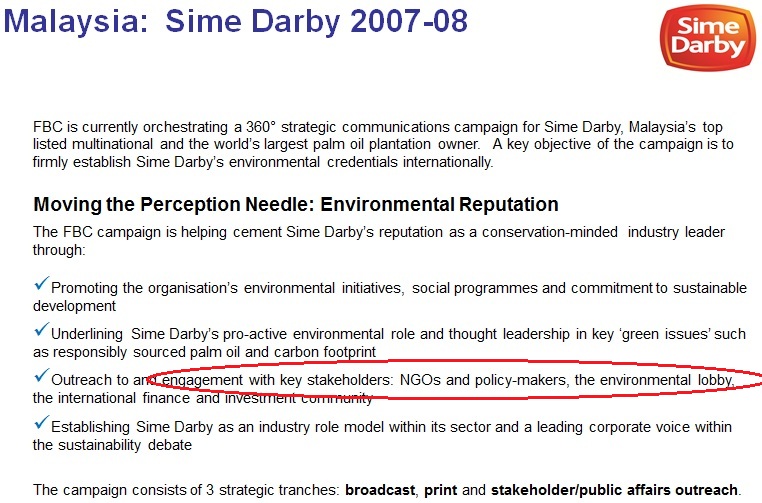
Greenwash agenda - disguising the destructive reality of the oil palm business with Green PR about 'sustainability efforts'. Such campaigns do not come cheap, but Sime Darby and Taib Mahmud were prepared to pay!
Sime Darby was paying FBC millions of ringgit to conduct this illegal PR campaign, known as ‘Greenwash’, which is all about perception rather than reality.
Compromised?
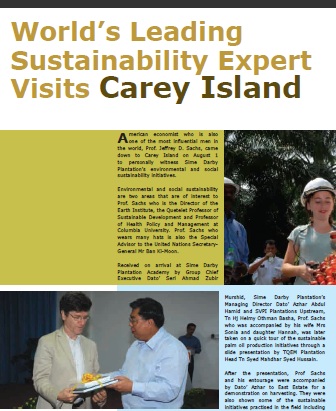
- Fun for the family? ‘World Sustainability Expert’ Sachs tours Sime Darby’s showcase Carey Island. Pity he did not have time to come and see the destruction of Sarawak
Given this calculated and well-funded agenda and the widespread knowledge about the dangers of ‘Greenwash’ campaigns, one might question the wisdom of Professor Sachs in accepting a family tour for himself, wife and two children to Malaysia and India in 2008, escorted in the Sime Darby private jet.
Insiders have revealed that, throughout the trip to Sime Darby’s showcase plantation on Carey Island, Sachs and his family were accompanied by a then employee of the PR agency APCO, Razi Rahman, which was working for the Malaysian government at the time and continued to have close links with FBC Media.
Sime Darby’s newsletter recorded the event and explained how the Carey Island Managing Director headed a reception team at the airport which then proceeded to show the Sachs family round.
Unfortunately, the Professor did not appear to realise that he was the prime target of an expensive PR effort, which was being ultimately paid for by the people of Malaysia.
Sarawak Report has researched a number of subsequent appearances by Jeffrey Sachs on FBC programmes for CNBC and the BBC, some of which raised eyebrows among those concerned about genuine sustainable development.
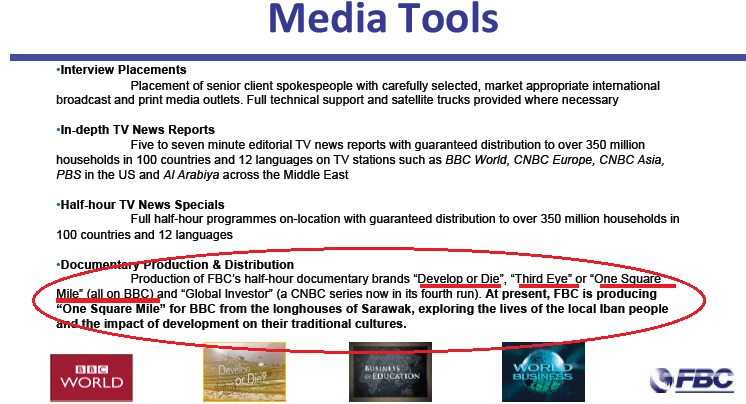
Positive programming, masquerading as genuine reporting
Just last June Sachs appeared on FBC’s World Business Programme for two consecutive weeks providing a set piece interview on global warming and sustainability. At the same time he appeared numerous times in a BBC programme Third Eye, focusing on the ‘world food crisis’.
The show painted a picture of imminent catastrophe and starvation if more palm oil was not grown. It also presented a positive picture of the impact of palm oil on Malaysia:
- “Third Party Endorser” – Sachs appears on BBC’s Third Eye for FBC Media
“The growing trade in palm oil is providing much needed income to poorer farmers in Malaysia, where living standards are rising. It is also giving jobs to poor people who once owned no land” The programme explains and it features a Malaysian small-holder who is represented as a typical palm oil producer!
By taking part in the programme, Sachs was made to appear to endorse this positive message. However, such claims would not satisfy many poor people in Sarawak, where most of the palm plantations are run by enormous companies like Sime Darby or owned by members of Taib’s family and cronies. In Sarawak it is the poor people who have had their native lands grabbed and handed to plantations, not the other way around.
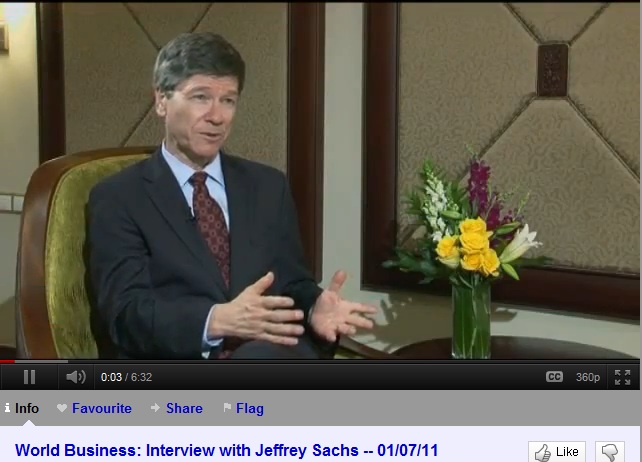
- Job lot – same interview different channel! FBC got two interviews for CNBC out of the Sachs interview, plus the BBC Third Eye.
As for jobs, the plantations prefer to bring in immigrant workers paid as low as RM 8 a day, leaving the locals unemployed. Likewise, those so-called cooperatives run by SALCRA have in fact delivered a pittance in profits for the poor small farmers, since most of the money seems to have been ‘lost’ by the manager of the state-led enterprise, Deputy PM Alfred Jabu!
Few people in Sarawak would therefore recognise the story being painted by FBC Media of people being made better off by palm plantations. Rather, they would understand the findings of the World Bank, which concluded that large scale palm plantations make the local people poorer, because they lose their lands to big plantation businesses, like Sime Darby.
However, BBC’s Third Eye programme on palm oil, which was produced and scripted by FBC as a supposedly objective documentary ,closely followed the strategy below, laid out in FBC’s proposal documents for the Malaysian Palm Oil Industry:
“The programme will put a particular focus on small farm holders – to emphasise the often overlooked fact that these constitute the majority of players in an industry too often associated to large corporate interests…… We should take the Malaysian example as a sign to reassess many assumptions about the environmental impact of industry in the developing world, and remember that our well-meaning sentimentality can have profoundly negative consequences for people trying to work their way out of poverty.”
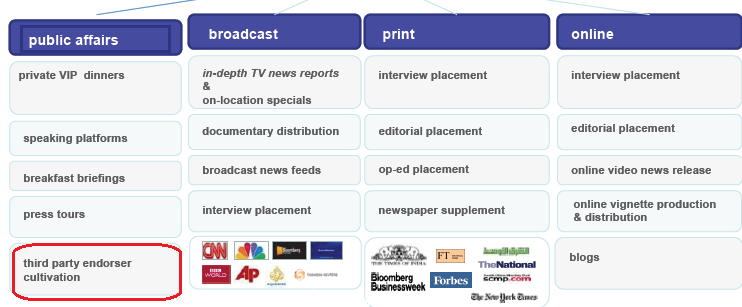
- Sachs cultivated as a ‘Third Party Endorser’?
World-wide corruption through Greenwash millions
Our evidence shows that Professor Sachs was not the only apparently unwitting ’tool’ of Sime Darby. Others too have been pawns of the palm oil industry’s strategy of cultivating third party champions. By allowing themselves to be ‘cultivated and influenced’ in this way, these highly-regarded ‘ambassadors’ have done no service to the genuine poor of Sarawak and Malaysia, whom they claim to be trying to help.

FBC's 'One Square Mile' for BBC World was paid for by Taib as one of the PR opportunities to present his government in a good light. The programme presented a picture of a government trying to help the people and ignored the logging, land grabs and plantation problems.
To the contrary they have merely performed a highly funded service for the rich land-grabbers, who are behind the destruction of the environment that these ‘sustainability gurus’ claim they are trying to save.
Likewise, the television companies which queued up to provide a platform for these FBC sponsored programmes, because they came so cheaply.
They should remember that their cheap programming has come at great expense to the desperate communities of Sarawak, who deserve honest reporting about their plight, and also to the tax-payers of Malaysia, who have funded FBC to the tune of millions of ringgit for this deceptive PR.
BBC, CNBC, CNN and all the global broadcasters who regularly carried biased programming by FBC media to promote big businesses and the Malaysian and Sarawak State Governments, should all now come to Sarawak and fully report on the real problems behind the destruction of the Borneo Rainforest and the suffering of its people.
Political corruption, big agri-business and lawlessness are the problems that need to be identified and addressed. Instead we got Greenwash. - Sarawak Report




No comments:
Post a Comment
Note: Only a member of this blog may post a comment.